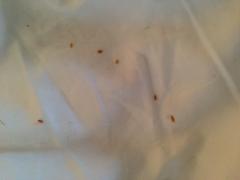Weird Worms

Weird Worms
Practicing in an urban setting, we don’t see too many pets with worms, partly because the city lifestyle reduces exposure to fleas and vermin which transmit worms and partly because I follow the Companion Animal Parasite Council and recommend year round heartworm prevention. Those medications control many common intestinal parasites. Here is information about some of the less common worms veterinarians see in pets.
Tapeworms
The photograph on the right came in with one of my patients the other day. The owner was concerned about the rice grains she was seeing on the dog’s bedding and was worried her dog was not digesting the rice in the lamb and rice dog food. What she thought were rice grains were actually tapeworm segments. Dogs become infected with tapeworms when they ingest a flea or eat a small mammal containing tapeworm eggs. Inside the dog’s intestine, a tapeworm consists of hundreds of little segments which are connected to form a worm. Segments break off and can be found moving around near the anus or on your dog’s bedding. Safe dewormers are available to eradicate tapeworms from your dog, but protecting your dog against fleas and limiting their access to vermin will also prevent them from acquiring tapeworms.
Raccoon Roundworms
Even though NYC is urban, we have lots of raccoons. I saw three youngsters washing their hands in a Central Park pond about two weeks ago. Raccoons carry a roundworm in their intestine (Baylisascaris procyonis) and shed roundworm eggs in their feces. Raccoon roundworm eggs are very hardy and remain infective in the soil for years after being shed in the stool.
The New York City Department of Health and Mental Hygiene advises New Yorkers to avoid raccoon latrines (the area where raccoons repeatedly defecate) and to wash their hands if they come in contact with raccoon feces. Children are especially susceptible to infections with the raccoon roundworm.
Tracheal Worms
Most pet owners think of worms as living in the intestine, but there are worms that live in other organs as well. Dogs can be infected with two different species of tracheal worms, Crenosoma vulpis and Filaroides osleri. F. osleri induces the formation of wart-like lesions in the trachea and bronchi of infected dogs, causing a hard, dry cough. Dr. Kelly Gisselman, an AMC trained ACVIM certified small animal internal medicine specialist, recently posted a YouTube video of a worm she spied while performing a bronchoscopy on a young dog with a cough. Deworming completely resolved the cough which had been going on for a year and a half! Since the worm did not induce the formation of wart-like lesions, we suspect it is C. vulpis.
Protecting Your Pets and Your Family Against Weird Worms
- Check out the Companion Animal Parasite Council’s website for more information on pet parasites.
- Wash hands thoroughly with soap and water after being outdoors and before eating.
- Administer year round monthly heartworm prevention. Those effective against dog roundworms will also treat raccoon roundworms.
- Use medications to prevent fleas which carry the infective form of the tapeworm.
- Clean up raccoon feces on your property, but wear gloves and wash your hands after doing so.
- Put trash in tightly covered containers and don’t put food out for wildlife that may carry weird worms.

































